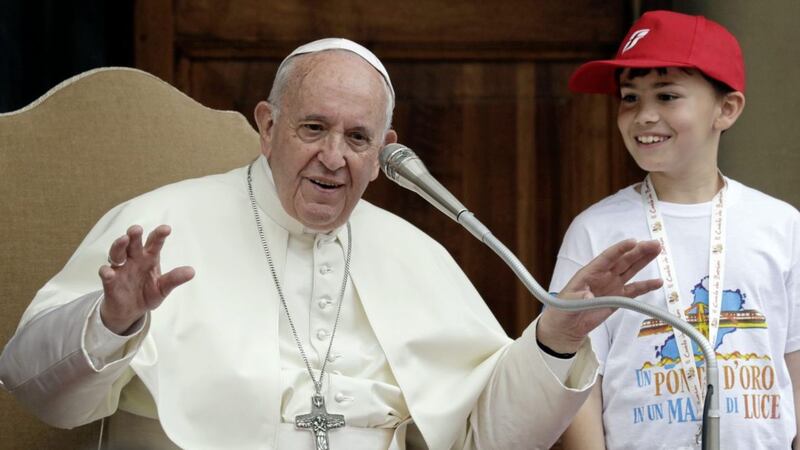CHAOS can be a blessing. In the scriptures, chaos is often used to highlight the ongoing inventive and redemptive work of God: "You have turned my mourning into dancing, you have taken off my sackcloth and clothed me with joy" (Psalm 30:11).
We need a greater understanding of that truth in both Church and society today.
Cardinal Carlo Martini reflected that "in affluent Europe we are a tired Church" and when you think upon what we are dealing with in the Church today, it is hardly surprising that people are tired: abuse; cover up; loss of moral authority; falling numbers; decline in vocations; people leaving because they no longer feel welcome. We have lost our way.
Even the current best efforts at renewal in the dioceses, parishes and religious congregations more often than not lead to frustration and burn out.
The problem with renewal is that the focus is on the 'bringing back to life' former ways of doing things or of expressing something, even when done in creative and imaginative ways.
Maybe we need to think more about re-founding our Church rather than renewing it, and letting the cherished structures and processes die when they no longer serve the mission of our institutions.
How many good people in our Church are suffering burn out, frustration, low morale, sheer physical exhaustion, loss of purpose and meaning?
Why? Because the horse is dead and yet we continue to keep hitting it. We are pouring new wine into old wineskins.
It can be a source of great frustration for many of us still committed to making the vision of building God's kingdom a reality in our world today.
At times this vision sits very comfortably alongside the institutional Church, but there are times when to keep our sanity we need to remind ourselves that the Church is not the kingdom.
Some things are clear. Society is not working as it should. Politics are not working as they should. The Church is not working as it should.
A time when many of our assumptions about how lives work are being turned inside out by new technology in the quest to be more productive, more efficient, better than before... it seems that the guts and the passion is being wrenched out of life.
Too many of our customs; practices and institutions were designed for a world that has now gone.
If that is true in our wider society, it is certainly true of our Churches. The temptation within Church though is to see ourselves as somehow different from these other institutions.
Maybe we need to think more about re-founding our Church rather than renewing it, and letting the cherished structures and processes die when they no longer serve the mission of our institutions
It is as if we have somehow manufactured a protective bubble to isolate us from the contamination that wants to infect that which is most precious to us.
Hence, in the midst of many positive initiatives, the movement that is pushing most vigorously at this moment of chaos is that of trying to restore the Church to its former 'glory', witnessed in a growing conservatism, for example in clerical dress and traditional practices.
The difficulty of this approach is that this sought-for former glory never existed in the first place.
What was perceived as authority and influence was often a cover up for the widespread abuse and humiliation of people.
We can develop the greatest pastoral plans and vision statements. We can hold listening processes until the cows come home and develop innovative learning programmes; but if we do not change our way of thinking then we will experience continuing frustration and disappointment.
As a Church we all need to critically reflect themselves on the theological and interpersonal assumptions that we act out of.
The development psychologist Roger Gould, who studied the process of becoming adult, shows that the process involves challenging those false assumptions that we instinctively hold to be true.
The journey towards adulthood involves giving up former false beliefs or assumptions.
Psychotherapist Dr Kevin Egan was head of the Department of Behavioural Sciences at All Hallows College and will be facilitating a Summer Institute at Tobar Mhuire in Crossgar later this month.
He observes: "An assumption that I think blocks laity in being adult in the Church is the belief that the best people to bring about change in the Church are the ordained, because after all the Church belongs to them.
"This assumption and the credibility that we instinctively gave to the ordained leaders in the Church was challenged by the clergy sexual abuse scandal.
"It led some Catholics to leave the Church and many to hold on by a thread.
"Many Catholics who desire reform in the Church find themselves questioning their assumption that the Church is reformable."
The opening sentence of paragraph 102 from
[ Evangelii GaudiumOpens in new window ]
, Pope Francis's 2013 apostolic exhortation, reads: "Lay people are simply, the vast majority of the People of God."
Percentage-wise, they make up 98 per cent. "The minority - ordained ministers - are at their service," continues the Pope.

This statement challenges a basic assumption held by many good Catholics over the years who have sincerely believed themselves to be the 'helpers' of the clergy.
Likewise, it challenges the assumptive world of the ordained. Their primary role is not to offer the sacrifice of the Mass but to be 'servant leaders' in the community.
This presents us with a vision in which the flowering of the laity's role in the Church is not to be equated with the numbers involved in lay ministries.
Pope Francis expresses some disappointment that this involvement "is not reflected in a greater penetration of Christian values in the social, political and economic sectors. It often remains tied to tasks within the Church, without a real commitment to applying the Gospel to the transformation of society".
Those who follow a hierarchical model of the Church assume that authority rests with the hierarchy and they should hold on to the decision-making.
Francis expresses regret that this has been the case. He complains of "an excessive clericalism which keeps them" - meaning the laity - "away from decision-making".
It is in this context that the Annual Summer Institute takes place in the Passionist Retreat Centre at Tobar Mhuire on Thursday June 28 and Friday June 29.
Pope Francis expresses regret at the hierarchical model of Church, complaining of 'an excessive clericalism which keeps them' - meaning the laity - 'away from decision-making'
It takes up the theme 'Finding a Home in Today's Church'. Belonging to a home in the Church was something that in previous times we took for granted.
In the light of recent experiences, this sense of being at home in the Church is something that we can no longer take for granted.
Many people find themselves in a struggle with a Church that leaves them with more questions than answers and in which they find themselves living at the edge.
So where can we can find hope in a time of uncertainty and change? We can rush to rediscover the certainty of the past, or we can take the risk of embracing the uncertain waters of change with a faith in the God who has touched all our lives in surprising ways.
The challenge of change - whether in a diocese, parish or religious community - is to awaken the hope that is within us and to redefine and redirect our mission.
The Summer Institute will explore how we might enflesh a theology of hope in the Church community.
Among the questions to be addressed are:
- What are the challenges of belonging to the Church today?
- How has the experience of belonging to the Church changed for you?
- What do you not hear spoken of in the Church?
- What would you like to hear spoken of in the Church?
- Is this a good time to be in the Church?
- What experiences have changed your faith or beliefs?
The aim is to join with like-minded people to work through and engage with these questions, rather than stay at home and complain about the Church...
The Annual Tobar Mhuire Summer Institute on the theme of 'Finding a Home in Today's Church' will be facilitated by Dr Kevin Egan and Cora Lambert on Thursday June 27 and Friday June 28. For more information, contact the secretary by telephoning 028 4483 0242 or emailing secretary@tobarmhuirecrossgar.com








